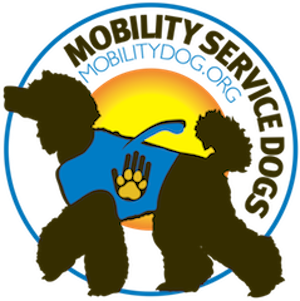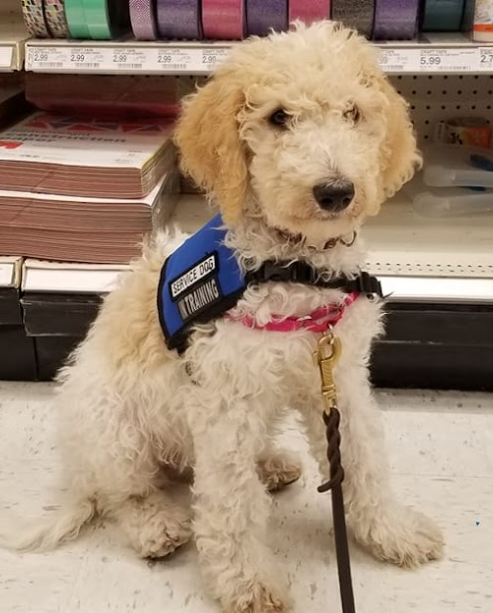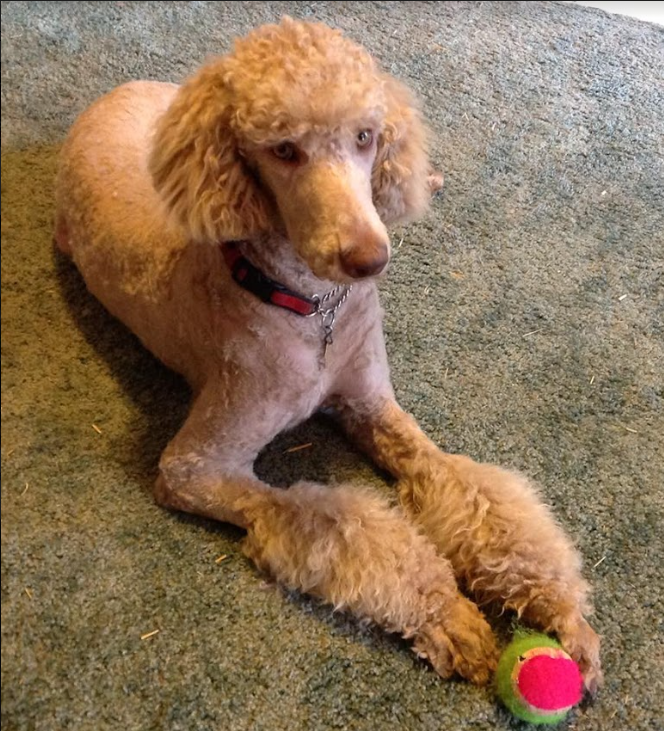Training a Service Dog Takes Coordinated Contributions
Service Dog Poodle Puppy in Training
Training a service dog is a team effort. The puppy raisers, the professional dog trainer and the handler all play key roles. Anna trains pups for MobilityDog as well as for other organizations that place dog helpers with folks who need them. She knows the recipe for creating the ideal mobility service dog: consistency and coordinated contribution from a crew of folks.
Service Dog Training: Phase 1 (The First 18 Months)
White and Brown Poodle Puppy
Puppy raisers have responsibility for the first 18 or so months of the dog’s life. “They teach the dog basic obedience – sit, stay and wait. Puppies are like kids – they learn from repetition and consistency.” In other words, just as with children, mom can’t require one thing while dad intends another, so puppy raisers who work in pairs must be in sync.
Puppy raisers also take charge of socializing the dog with people, individually and in crowds, and with other dogs. Early socialization is important to avoid excessive watchfulness or timidity. “It takes a good year for a dog to understand what we want from it and how to respond to words,” Anna says.
Service Dog Training: Phase 2 (The Next 3-6 Months)
This is when Anna takes over. “All dogs aren’t created equal, so I have to tailor my training to the individual animal. For instance, some are more reactive than others, so I have to take this into account.” But Anna is good at her job and she’s never had a dog wash out of the Mobility Service Dog program because of a reactive personality.
Service Dog in Training
“When I’m finished, it’s a different dog – confident, obedient, ready to work with a handler. But my role doesn’t end there.”
Service Dog Training: Phase 3 (The Handoff)
This is the post-graduate portion of a service dog’s education. “It takes about three months for a dog to bond with a handler,” says Anna. It’s not necessarily an easy process, partly because different individual handlers have different needs. Some need help with balance, whereas others want assistance with the retrieval of objects or with identifying sounds. Dogs and handlers must get to know each other before they can play their respective roles successfully. Anna spends as much as a day a week with new dog/handler teams to help both with the transition.
Service Dogs Must be Able to Adapt
As they move into a new setting, dogs must adapt. Indeed, adaptability is one of three categories of dog intelligence often measured by vets and trainers (the others are instinctive intelligence and obedience and working performance). A dog with high adaptive intelligence can learn for itself from experiences and solve problems. For example: a dog who has learned to fetch his leash when you put on your coat to go out. (Of course, the really smart ones know your “going-for-a-walk” coat from your “going-out-to-a-movie” coat and will react appropriately).
Light Brown Poodle Service Dog
For a service dog, adapting to a new handler means coming to understand that individual’s body language, intonation and pronunciations. These may all vary significantly from what the dog experienced as a puppy or a student of Anna’s. On top of all this, the dog is moving to a completely new environment and will likely experience a least some confusion while getting used to a new space and a new routine.
Poodles, it turns out, are particularly high in adaptive intelligence – thinking dogs, if you will. “Poodles are analytical,” Anna says. “They take their time to assess the situation before they react. They want to know what’s in it for them. But when they decide, they usually make the right choice.” Because of their cool analytical side, poodles can sometimes come across as reserved. This is really just good manners with strangers; they are typically very friendly with people they know, and will always pay rapt attention to their handlers.
Service Dogs are Super Dogs!
A dog is a complex mammal, and training one takes expertise, time and patience. Trainers like Anna, in concert with dedicated puppy raisers and loving handlers, turn puffy, playful pups into proud performers: ultra-smart, highly educated, supremely competent canines. Their vests may say Service Dog, but “Super Dog” might be closer to the truth.




